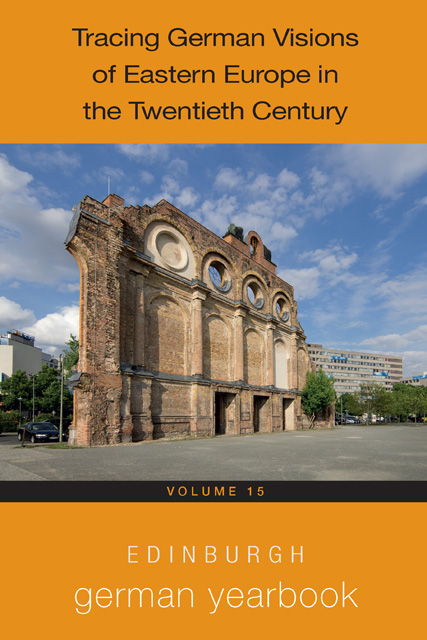Book contents
- Frontmatter
- Contents
- Miscellaneous Frontmatter
- Between Estrangement and Entanglement: An Introduction to German Visions of Eastern Europe in the Twentieth (and Twenty-First) Century
- Colonizing a Central European City: Transnational Perspectives on Kronstadt/Braşov/Brassó in the First Half of the Twentieth Century
- Exile as a Literary-Political Mission: Leo Katz’s Antifascist Bukovina Novel Totenjäger (1944)
- Brunnenland: The Image of the Bukovina in Paul Celan
- “Auch bei uns im fernen Transsilvanien”: The Transylvanian Saxons and the Long Shadow of the Third Reich in the Work of Bettina Schuller
- Through an Orientalist Lens: Colonial Renderings of Poland in German Cinema after 1989
- The Nazi Ghost and the Sinti Woman in Kerstin Hensel’s Bell Vedere (1982)
- The Haunted Landscape of Babi Yar: Memory, Language, and the Exploration of Holocaust Spaces in Katja Petrowskaja’s Vielleicht Esther (2014)
- “dann hüpfe ich auch, komisch und ungeschickt, wie eine Nadel auf einer abgespielten Platte …”: Translational Ethics and Affects in Katja Petrowskaja’s Vielleicht Esther (2014)
- Expanding the Nationalgeschichte: Multidirectional European Memory in Nino Haratischwili and Saša Stanišić
- Reading Photographic Images and Identifying Mnemonic Threads of the Post-Memorial Project in Sie kam aus Mariupol (2017) by Natascha Wodin
- Navid Kermani’s Entlang den Gräben (2018) and Its Readers: Remapping Europe’s East
- Notes on the Contributors
Exile as a Literary-Political Mission: Leo Katz’s Antifascist Bukovina Novel Totenjäger (1944)
Published online by Cambridge University Press: 11 January 2023
- Frontmatter
- Contents
- Miscellaneous Frontmatter
- Between Estrangement and Entanglement: An Introduction to German Visions of Eastern Europe in the Twentieth (and Twenty-First) Century
- Colonizing a Central European City: Transnational Perspectives on Kronstadt/Braşov/Brassó in the First Half of the Twentieth Century
- Exile as a Literary-Political Mission: Leo Katz’s Antifascist Bukovina Novel Totenjäger (1944)
- Brunnenland: The Image of the Bukovina in Paul Celan
- “Auch bei uns im fernen Transsilvanien”: The Transylvanian Saxons and the Long Shadow of the Third Reich in the Work of Bettina Schuller
- Through an Orientalist Lens: Colonial Renderings of Poland in German Cinema after 1989
- The Nazi Ghost and the Sinti Woman in Kerstin Hensel’s Bell Vedere (1982)
- The Haunted Landscape of Babi Yar: Memory, Language, and the Exploration of Holocaust Spaces in Katja Petrowskaja’s Vielleicht Esther (2014)
- “dann hüpfe ich auch, komisch und ungeschickt, wie eine Nadel auf einer abgespielten Platte …”: Translational Ethics and Affects in Katja Petrowskaja’s Vielleicht Esther (2014)
- Expanding the Nationalgeschichte: Multidirectional European Memory in Nino Haratischwili and Saša Stanišić
- Reading Photographic Images and Identifying Mnemonic Threads of the Post-Memorial Project in Sie kam aus Mariupol (2017) by Natascha Wodin
- Navid Kermani’s Entlang den Gräben (2018) and Its Readers: Remapping Europe’s East
- Notes on the Contributors
Summary
Both Leo Katz’s (1892–1954) name and his novel Totenjäger (1944, Death Hunters) are barely known at all in German-speaking culture or academic Germanistik. This is unjust, because Katz is one of the most important German-language authors of Jewish descent from Bukovina, a German-speaking literary landscape in Eastern Europe that emerged in the Habsburg period and endured through the process of Romanianization after the dissolution of the Austro-Hungarian monarchy, yet eventually foundered during the Second World War. Although Katz left Bukovina at the age of twenty-two, he repeatedly made literary returns to his native land—as in the case of his first novel Totenjäger. As is so often the case with exile authors, this work is hard to understand without an awareness of Katz’s eventful biography and his political convictions, as well as historical developments in Eastern Europe. Above all else, it is important to bear in mind that Totenjäger is not intended to be an autonomous aesthetic work, but is a Zeitroman (novel of the times) that reacts to, comments upon, and offers an interpretation of historical reality. In that regard, this novel is highly characteristic of the German-speaking exile community in Mexico of which Katz was part: here, the antifascist, communist, and pro-Soviet worldview of the German-speaking émigrés comes out to the full.
Leo Katz’s Life and Work
Leo Katz came from a Hassidic family from Siret, a small town in Bukovina with a predominantly Jewish population. Until the end of the First World War, Siret belonged to the k. u. k. (i.e., kaiserlich und königlich) Habsburg monarchy and sat on the Romanian border; and from 1919, the town was in Romania. Both Katz’s religious background and growing up in a multiethnic Bukovina milieu loyal to the Habsburg regime took on vital significance in his private and literary life. As a result of his orthodox upbringing, Katz always held on to the daily devotional readings from the Tanakh and devoted himself to the history of Judaism even beyond his studies in Vienna, where he wrote his dissertation on the impact of the Black Death on the situation of the Jews in Germany; but this form of socialization also gave a particular color to his literary works, for example, in updating episodes from Jewish history and the Tanakh. Not least, Katz thanked his origins for his mastery of Yiddish as a second mother tongue, alongside German.
- Type
- Chapter
- Information
- Edinburgh German Yearbook 15Tracing German Visions of Eastern Europe in the Twentieth Century, pp. 56 - 84Publisher: Boydell & BrewerPrint publication year: 2022



